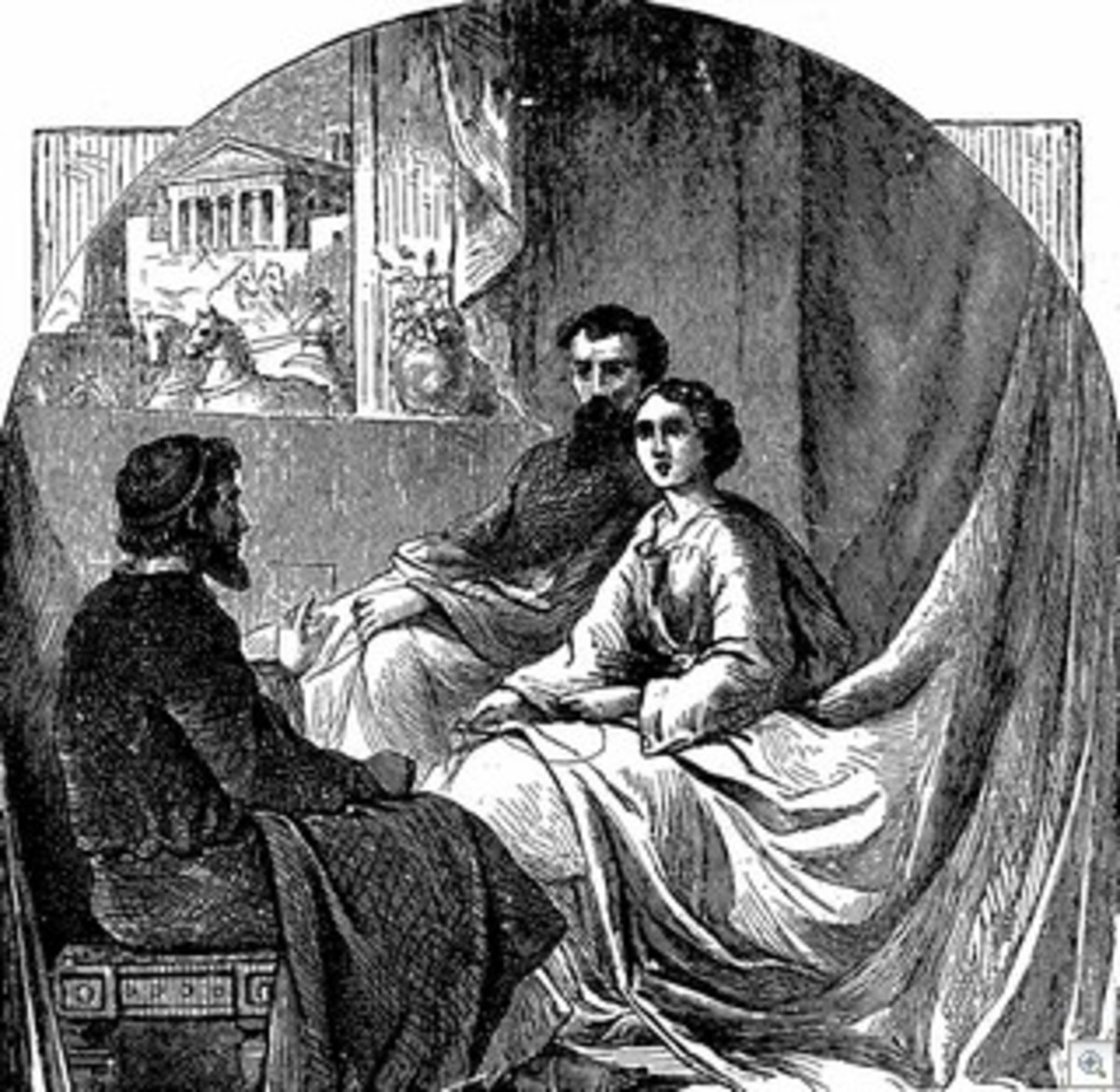Bible: What Does Hebrews 11:1-22 Teach Us About The Bible's "Hall of Faith" (Part One)?
Faith

Creation Out of Nothing?
Do you believe that God created everything out of nothing?
Hebrews 11: The "Hall of Faith" (Part One)
At the outset of the famous “Hall of Faith” chapter, an interpreter must grasp the meaning of two predicate nouns in the author’s concise description of faith in verse one: substance (realization) [assurance (reality), NASB] and evidence (confidence) [conviction, NASB.]
[Charles Ryrie’s well-phrased comment deserves special mention: “Faith gives reality and proof of things unseen, treating them as if they were already objects of sights rather than of hope” (New Testament Study Bible, 412).]
Many Old Testament patriarchs and heroes (“elders”)—snippets of whose lives the author reviews next—exercised this supernatural gift and gained approval (from God and godly people?) [“a good testimony,” NKJV, v. 2.].
However, before beginning his survey by alluding to Abel’s contribution to the topic, the writer notes that all believers gain an understanding of reality by [an exercise of] faith when they put their trust in the reliability of the Genesis-based statement that God’s word set the parameters of (“framed”) the space-time continuum, and prepared from eternity past all the contents of angelic and human history.
They know that God did not make the creation out of visible things (v. 3).
[By divine fiat, the LORD created everything out of nothing that we can see.]
The Patriarch Enoch
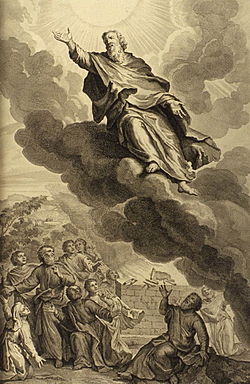
The Faith of Abel and Enoch
Next, the author relates that, according to God’s testimony, Abel’s “more excellent sacrifice” demonstrated the righteousness of his faith, and that his decision to obey God remains a good example to follow (“he being dead still speaks”) [v. 4; cf. Gen. 4:3-5].
He quickly moves on to Enoch, whose faith especially pleased God; for some reason the LORD “took away” this patriarch before death claimed him (v. 5; cf. Gen. 5:21-24).
[Though Enoch may be a figure of the Church, which God will snatch away at the “Rapture” before the seventieth week of Daniel commences, partial rapture theorists should not regard him as proof of the truth of their view.]
Before resuming his review of the faithfulness of certain patriarchs, the writer inserts faith’s two-fold characteristic that makes it an indispensable tool to those who desire to please God.
Those who profess faith in the Lord (“he who comes to God”) must first believe that God exists, and then they must trust that God will reward them for diligently seeking Him (v. 6).
Noah's Ark
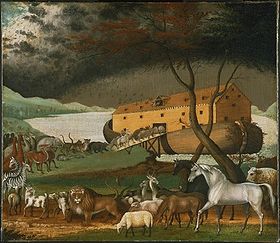
The Faith of Noah
Noah's Faith
Next, the author considers Noah’s faith. After God warned him about a future event (“things not yet seen”), Noah, motivated by reverence for his Creator and His commandment, built the Ark to save as many people as possible from the watery cataclysm.
Tragically, only his family responded favorably to his preaching, and the rest of the world perished. He thus became heir of a faith-type of righteousness (v. 7).
[The Ark, though a very large vessel, could only house a limited number of people. God foreknew that the people of Noah’s day would reject his message and that they would all perish.
Therefore, He commanded Noah to build a ship that suited the task. Perhaps if more people had responded, God would have commanded them to build their own Ark.]
Yahweh: "Count the Stars, Abraham"
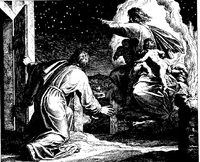
The Faith of Abraham, Isaac, and Jacob
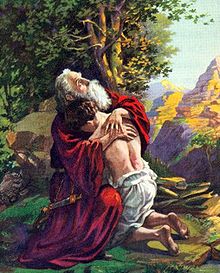
Abram Believed God
view quiz statisticsAbraham, Isaac, and Jacob
A discussion of the faith of Abraham ensues in two parts and in some detail (vv. 8-10, 17-19).
Part one recalls the patriarch’s obedience to God’s call to leave his home and travel to an unknown land that the LORD promised to give him as an inheritance (v. 8; cf. Gen. 12:1-4).
There Abraham dwelt in tents with Isaac and Jacob (fellow heirs of God’s promise) as aliens (v. 9).
As a man of faith, he fixed his sight on the heavenly city of God (the heavenly Jerusalem, 12:22); earthly possessions did not capture his heart (v. 10).
In part two, when the LORD commanded him to sacrifice his only begotten son Isaac, Abraham responded to the test by believing that God would resurrect his son so that the latter could inherit the promises (vv. 17-19; cf. Gen. 22:1 ff).
In connection with Abraham, of course, stood his wife Sarah who, after surviving a bout with foolish laughter, actually believed God’s promise that she would bear a child in her old age (v. 11; cf. Gen. 21:1-5).
The author concludes his first section about Abraham by stating that God fulfilled His promise to the “good-as-dead” patriarch by granting him an innumerable multitude of descendants (v. 12).
Regarding these saints of old, the writer remarks that every one died without seeing the fulfillment of God’s promises to them.
Still, they kept the faith, resting assured that one day God would bring His word to pass.
They held His promises close to their heart, and acknowledged to themselves that they were but sojourners (“strangers and pilgrims”) on the Earth (v. 13).
He notes that people who speak this way indicate that they seek a “country of their own” (v. 14, NASB).
If the patriarchs had taken time to think about Ur, the author asserts, they might have returned there to their old home.
They, however, wanted to dwell in a better place—what believers know now as the New Jerusalem.
For this reason, the LORD feels no shame for believers to call Him their God, and He has deigned to build it for them (vv. 15-16; cf. John 14:1-2).
Next, the author briefly mentions the faith of Isaac and Jacob as consisting of blessing their sons.
Isaac spoke to Jacob and Esau about the future (“things to come”), and Jacob worshiped God as he told the sons of Joseph about their inheritance in the Land (vv. 20-21; cf. Gen. 48:1-22).
Last in this series, he writes about Joseph’s prophecy concerning the Exodus, and his instructions about the burial of his remains in the Land of Promise (v. 22; cf. Gen. 50:24-25).
© 2013 glynch1






